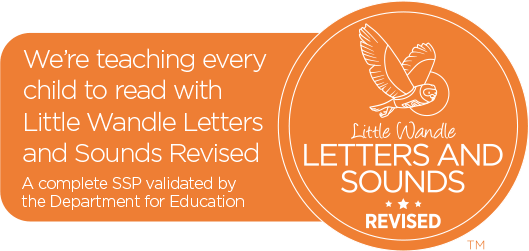Our Approach to Reading at Cuddington
At Cuddington, we really value to importance of reading and endeavour to foster a love of reading among all pupils. We teach reading through phonics, whole class reading and guided reading sessions. We select books that are carefully matched to children’s reading ability and include sounds that children have been previously taught in class.
Our goal is to instill a passion for reading by making it an enjoyable experience. Evidence shows that regular and pleasure reading boosts school performance. To inspire children to read for fun, we expose them to a variety of book-related activities. They participate in workshops hosted by authors, listen to storytellers, and attend book fairs, which bring the joy of reading to life. Additionally, each class has scheduled library visits, and every classroom features a book corner stocked with a range of captivating fiction and non-fiction books.
How we teach Reading at Cuddington
Systematic Synthetic Phonics Programme

Little Wandle Letters and Sounds
We use the Little Wandle Letters and Sounds Revised programme to teach phonics. The structured programme builds steadily on phonic learning, ensuring progression and consistency from the beginning of the Reception year through to the end of Key Stage 1. Pictures and catchphrases help the children to recall the graphemes (letters) and their corresponding phoneme (sound), a learned mantra supports the correct formation of each letter shape and daily phonics lessons allow the children to practise blending to read and segmenting to write every day.
For children who have not met the thresholds for phonic achievement will receive intervention. This may be as whole class, group or individual and follows Little Wandle guidance. Alongside the keep up intervention for Reception and Year 1, the Little Wandle Rapid Catch-up intervention can be used for children in Year 2 and above who need more support with mastering the phonic code and becoming fluent readers.
For those pupils who require further support as they transition to and continue through Key Stage Two, we use the same teaching resources and techniques in catch up lessons from the programme to consolidate learning.
How we assess Phonics
In daily phonics lessons, teachers use their assessment to target children who may need additional practise with the learning on the same day, as far as possible. If children are identified as in danger of falling behind, catch up sessions are put in place following the Little Wandle Letters and Sounds Revised programme.
In Reception and Year 1, the children are assessed at the end of every half term using the Little Wandle Letters and Sounds Revised assessments.
The children in Year 1 do the statutory Phonics Screening Check (PSC) in the summer term, which involves reading a set of words to assess how well they can decode.
Children who do not meet the standard of the PSC in Year 1 will have additional teaching and take this again in Year 2.
Children who need to consolidate their phonics skills beyond Year 2 will need catch up sessions and will be assessed to establish any gaps so that the lessons can be tailored to what is needed.
More information can be found on the Little Wandle website.
Little Wandle Overview Reception and Year 1
Supporting Reading at home
Early Reading
Children are provided with a reading pack which is sent home regularly. The reading pack links to the key sounds being taught in school and enables parents to support them at home. Decodable books are carefully matched to the children ability are sent home each week for additional reading practice.
Library
All children have access to the school library and are encouraged to select a book to read for pleasure, either by themselves or to share with an adult at home.
The presentation below provides information about how to support children with reading at home, whatever their level.

